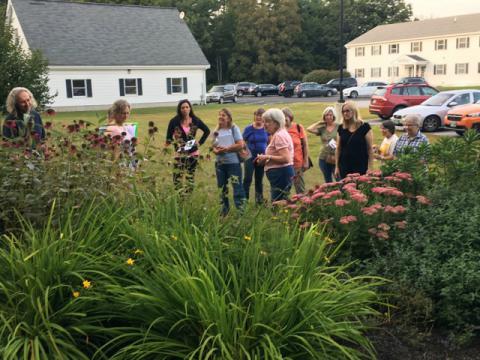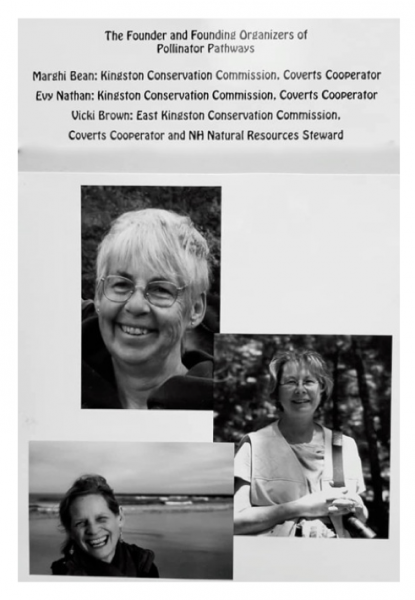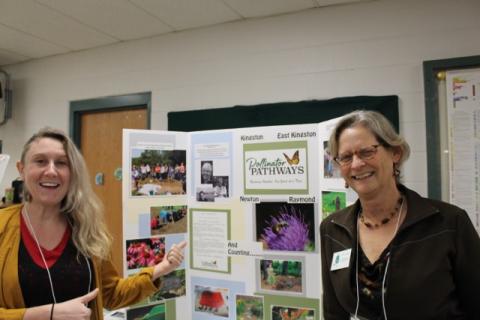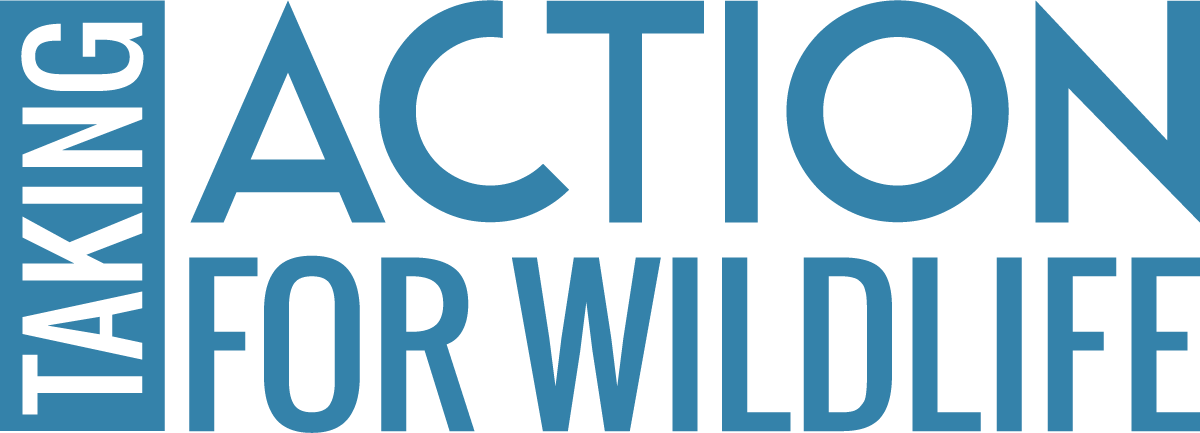Small Changes for Small Creatures

A summer Pollinator Pathways Conversations event was help at the Kingston Community Library garden, designed by Rie Sluder, president of the Herb Society of America, who led the tour. Photo by Evy Nathan.
So often we feel that one person can’t make a difference, but Pollinator Pathways, a new initiative started by the Kingston Conservation Commission, is challenging that notion by restoring habitat one yard at a time. Creating a Pollinator Pathway is a way to establish a conduit for insects to move unobstructed in a community. Founding members and NH Coverts Project volunteers, Marghi Bean and Evelyn Nathan (Chair) of the Kingston Conservation Commission wanted to increase awareness of pollinators and educate their neighbors on how important they are to us all. Marghi, a long-time member of the commission, formulated the idea early in 2018. Vicki Brown, a NH Coverts volunteer and Natural Resources Steward, became an enthusiastic core member, bringing excellent education and communication skills and the East Kingston Conservation Commission on board.
They kicked off the project in April 2019 with A Garden for Pollinators and Wildlife program that taught homeowners what they can do to help pollinators in their own yards. Education is an important component and those who attend Pathway events learn that pretty nectar plants and wildflowers are an essential component to attracting pollinators, but pollinator habit also consists of water, trees, cover, and larval nesting and overwintering habitat. Pollinator Pathways provides resources, handouts, and brochures to help homeowners learn how to create habit in their yards and gardens.

Pollinator Pathways plans to establish a conduit for insects to move without obstruction in a community. Marghi writes the monthly newsletter, and encourages neighbors to get involved. She advises, “Don’t ever feel like, it’s only me…what can I do?” All 217 Pathway members are pollinator promoters, making better habitat on their property to create a natural corridor for species like birds, bees, and butterflies, as well as other important pollinator species. This cross-town effort to connect pollinator species with the habitat they need to survive is catching on quickly. Conservation Commissions in nearby Chester, Newton, and Raymond support the effort started by Kingston and East Kingston.
Their monthly newsletters keep members engaged and offer tips like using native plants, leaving sections of your lawn unmowed, and keeping groundcover and leaves through the winter. This fall they spent time in the field gathering wildflower seeds for a seed exchange to establish more habitat for pollinators. They provided seeds for 3 species of milkweed as well as Joe-pye weed, yarrow, thistle, aster, and many more native plants to participants interested in creating natural environment for birds, bees and butterflies. They have had excellent feedback from participants on the increasing number of pollinators observed as a result of the seeds they gave out. At a recent Pollinator Pathways event, one volunteer mentioned that she had learned more about the importance of insects in that hour than in all her years in a garden club!
The project is centered on local conservation and outreach, primarily focusing on homeowners, and requires working together. The Kingston Recreation Summer Camp, local schools, Bakie Farm, and the Kingston Community Library have all been part of the effort, hosting events and adding pollinator gardens, or agreeing to maintain native meadows. New England Grassroots Environment Fund, the Exeter Area Garden Club, and NH Department of Transportation have all helped get Pollinator Pathways up and running with small grants and seed donations.

Volunteers Vicki Brown and Stephanie Aubert at the Pollinator Pathways display at the NHACC annual meeting. Photo by Cameron Cashman.
Right now, the Pollinator Pathways effort is focused on outreach in Rockingham County and they would like to expand to 8 towns before the end of the year. They want to continue to increase awareness of pollinators and how important they are to a healthy ecosystem. Birds, bees, butterflies, beetles, and other insects pollinate 75% of plants in the United States and they are responsible for 1 out to every 3 bites of food. “This initiative connects neighbors and helps people to understand they can make a difference to ensure these creatures survive and thrive,” says Vicki Brown. “It is so rewarding to hear from volunteers who have made small changes now see insects in their yard where they had never seen them before.” At the Kingston Days event one volunteer happily reported, “It brings me so much joy to watch these creatures feed and fly around my yard.”
Learn more about and join Pollinator Pathways at www.kingstonnh.org/conservation-commission
By Barbara Richter, NH Association of Conservation Commissions
Winter 2020 Taking Action for Wildlife Newsletter

